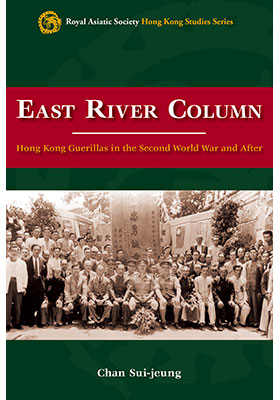East River Column
Hong Kong Guerrillas in the Second World War and After
(東江縱隊:抗戰前後的香港游擊隊)
ISBN : 978-962-209-850-3
June 2009
208 pages, 6″ x 9″, 21 b&w illus.; 2 maps
Ebooks
Hong Kong’s story in the Second World War has been predominantly told as a story of the British forces and their defeat on Christmas Day 1941. But there is another story: the Chinese guerrilla forces who harassed the Japanese throughout the occupation played a crucial part in the escapes from Hong Kong’s prisoner-of-war camps and in rescuing Allied airmen. This neglected part of Hong Kong’s war is Chan Sui-jeung’s topic in this pioneering book informed by his many contacts with participants in the guerrilla warfare.
The guerrilla group usually described as the East River Column gathered momentum in 1937 after China and Japan embarked on full-fledged war. Chan reports on its precursors and the formation of more formal structures that provided the basis for the guerrilla activities in Hong Kong between 1941 and 1945. Just as the guerrilla’s story starts before the Second World War, so it goes on after 1945 and is entwined with the civil war and the establishment of the People’s Republic of China. An important and valuable part of this book recounts how the leaders of the East River Column fared in the period up to and after the Communist victory. The book also sheds new light on the struggle between the Guangdong party members and the cadres from the north and “the problem of Guangdong” as it was characterized by Mao Zedong.
This book thus finally gives due prominence to the role of the Chinese guerrillas in Hong Kong during the war, while at the same time setting that struggle into the broader contexts of Guangdong Province, the long war between China and Japan, and the victory of the Communists and the early years of their rule in the South.
“Here for the first time in English is a comprehensive account of the huge contribution made by Chinese guerrillas to Hong Kong’s resistance in the Second World War. In rescuing this story from oblivion through 25 years of interviews and documentary research, Chan Sui-jeung has rendered a major service to the history of Hong Kong and Guangdong province.” —Philip Snow, author of The Fall of Hong Kong
“Much has been written about the Battle for Hong Kong and about the British Army Aid Group, but there is a dearth of written information about the exploits of the East River Guerrillas. Veterans will die and oral history sources will disappear over the next few years. Chan Sui-jeung deserves to be congratulated as his well-researched book covering relatively ‘virgin territory’ fills a timely need.” —Dan Waters, British Eighth-Army soldier in the Second World War and Past President of the Royal Asiatic Society Hong Kong Branch
“This is a story waiting to be told. For a long time, the heroism of the East River Guerrillas during the Second World War was legend. But the legend remained murky largely due to political sensitivities on the part of both the Hong Kong colonial administration and the Chinese communist authorities. Through painstaking work and sustained research over several decades, Chan Sui-jeung has resurrected the memorable acts and fates of this group of ‘dignified, honest and intensely proud’ men and women. In an unadorned yet informed narrative, he tells a moving tale touched with unexpected vicissitudes and historical ironies.” —Wong Siu-lun, Director of Centre of Asian Studies, The University of Hong Kong
“Few analyses have been undertaken on the East River Guerrillas in such detail as this book. The new perspective used by the author shows his immense knowledge of the topic and sheds new light on the study of the resistance in Hong Kong. The book is written in a literary style with easily comprehensible language. It will attract all those who are interested in the work of the East River Guerrillas.” —Ho Pui-yin, Director of Lee Woo Sing Hong Kong History Resource Centre, The Chinese University of Hong Kong




